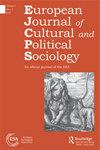敌人和朋友。COVID-19期间意大利通过推特实现民粹主义身份的工具性社会建构
Q1 Social Sciences
European Journal of Cultural and Political Sociology
Pub Date : 2022-10-03
DOI:10.1080/23254823.2022.2125421
引用次数: 1
摘要
本文基于2020年Twitter数据,研究意大利民粹主义身份的社会建构。本研究从Tajfel的社会认同理论(1978)出发,旨在剖析民粹主义认同建构过程的基础要素。分析的重点是对萨尔维尼(LN)、梅洛尼(FDI)、贝卢斯科尼(FI)和迪马约(M5S)四位民粹主义领导人的推文进行定量分析和定性检验。结果强调了外群体在强化相对剥夺以促进内群体认同中的地位和功能作用。此外,民粹主义的社会认同是建立在群体成员身份和内部群体与一个或多个外部群体之间的偏见比较之上的。结果表明,领导人的策略是如何根据他们是否在政府中以及他们在左右轴上的位置而变化的。在这方面,大流行病提供了进一步的政治机会,特别是对那些已进入政府的人。©2022欧洲社会学协会。本文章由计算机程序翻译,如有差异,请以英文原文为准。
Enemies and friends. The instrumental social construction of populist identity through twitter in Italy at the time of COVID-19
Based on 2020 Twitter data, this article studies the social construction of populist identity in Italy. Starting from Tajfel's social identity theory (1978), the research aims at dissecting the elements at the basis of the populist identity construction process. The analysis focuses on both quantitative analysis and qualitative inspection of the tweets of four populist leaders, namely Salvini (LN), Meloni (FDI), Berlusconi (FI), and Di Maio (M5S). Results highlight the outgroup's position and its functional role in strengthening relative deprivation to facilitate ingroup identification. In addition, the populist social identity is built on group membership and the biased comparison between the ingroup and one or more outgroups. Results demonstrate how leaders’ strategies change based on being in government or not and according to their position on the left-right axis. In this context, the pandemic offered a further political opportunity, especially to those who have found themselves in government. © 2022 European Sociological Association.
求助全文
通过发布文献求助,成功后即可免费获取论文全文。
去求助
来源期刊

European Journal of Cultural and Political Sociology
Social Sciences-Cultural Studies
CiteScore
1.90
自引率
0.00%
发文量
32
期刊介绍:
The European Journal of Cultural and Political Sociology is a peer-reviewed journal published under the auspices of the European Sociological Association. The study of culture is the fastest growing area in both European and North American sociology. Political sociology is also re-establishing itself as a central plank of the discipline.
 求助内容:
求助内容: 应助结果提醒方式:
应助结果提醒方式:


